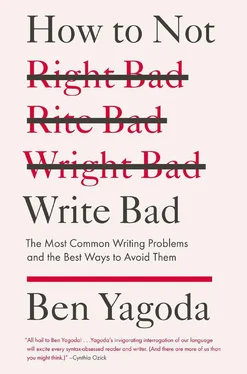She despises her mother.
C. Sentences
1. WORD REP.
The above phrase (the second part of which is an abbreviation for repetition ) is the comment I write most frequently on student papers. That’s because, I think, word repetition is a telltale — maybe the telltale — sign of awkward, nonmindful writing. The writer has presumably gotten the pertinent information onto the screen or page, but has not taken the time to read the sentence to herself, silently or out loud. If she did, that word rep. would sound like a fingernail on the blackboard. Consequently, “listening” to your sentences with the sensitivity and skill to pick up word repetition is a strong first step toward mindful writing.
There are some nuances to my unified theory of word repetition, which boil down to: the more common the word, the more leeway you have in repeating it, and vice versa. In the previous sentence, I repeated to, word, more, and the (twice!). That is not ideal, but it’s okay; readers are not likely to notice. On the other hand, I know I have to wait at least a few more pages before reusing nuances, leeway , or the expressions vice versa and boils down to. Words like repetition and common would be somewhere in between. I would not be able to use the notion of unified theory again in the entire article or book.
The word-repetition problem can be hard to solve. Usually, a writer uses a word twice because no alternative is self-evident or, sometimes, conceivable after what seems like a lengthy period of cogitation. A particular pitfall is the infelicity that H. M. Fowler dubbed elegant variation. He was referring to a synonym, near synonym, or invented synonym used for the express and blatant purpose of avoiding word repetition.
For example (EV in brackets):
Hartnell read the newspaper. When he was finished [with the periodical], he got up and went outside.
Spence hit a home run in the second inning, his fifth [circuit clout] of the campaign.
In these cases, as is often true, the simplest solution is simply to take the EV out. Voilà! Incidentally, perceptive readers may have noticed that the second sentence contains another EV: the campaign. Mediocre sportswriters are elegant variers to the bone, and they will reflexively seek to avoid a common word, in this case season. However, season is better than campaign .
Back to word repetition, check out these examples from student work, with the repeated word underlined. First make sure you read them attentively enough to notice that the repetition is unfortunate. Below each sentence I’ll suggest a fix.
[ Spending the day rushing from Memorial Hall to Main Street to Trabant is a typical day at the University of Delaware. ]
Pretty easy.
A typical day at the University of Delaware involves rushing from Memorial Hall to Main Street to Trabant.
Improving this one doesn’t involve much heavy lifting, either.
[ When I was an undergraduate student earning a minor in painting I developed a particular interest in de Kooning’s paintings. ]
When I was an undergraduate earning a minor in painting, I developed a particular interest in de Kooning’s work.
Here’s one that’s easier still:
[ Johnson is the youngest representative in the legislature. When he was twenty-three, Johnson defeated the Republican incumbent. ]
For some reason, many writers tend to needlessly repeat proper names, apparently forgetting that at their disposal are the very useful pronouns he and she —which have the added value of being the category of common words, mentioned above, that can be repeated with near impunity.
Johnson is the youngest representative in the legislature. At twenty-three, he defeated the Republican incumbent.
Moving to something a little more challenging, here’s one that requires some mindful pruning. (Note, in passing, the use of the passive voice. It’s a problem in the original because, among other reasons, the identity of “they” is not given. But contrary to what’s often written, the passive can be effective, and I think it is in the revision.)
[ During the journey children were abducted and taken into captivities where they turned the boys into child soldiers carrying guns twice the size of the young boys. ]
During the journey, the boys were abducted, taken into captivity, and turned into soldiers carrying guns twice their size.
Sometimes, writers seem to develop a repetition compulsion regarding a particular word:
[ Whether they are nice robots like Rosie the robot maid in the Jetsons, C3PO in Star Wars; or mean robots like the robot overlords in the Matrix, robots are a steady figure in popular culture. ]
Whew. Robot much? I think my approach to this would be to embrace the repetition, somewhat, specifically going from five iterations to three, and meanwhile fixing the punctuation and changing that phrase steady figure. So it would become:
Whether they are nice robots like Rosie the maid in The Jetsons and C3PO in Star Wars, or mean robots like the overlords in The Matrix, robots are recurring figures in popular culture.
(Or you could just take out every robot except the last one. Your choice.)
Here’s an insider’s tip. Take a look at the example I gave a few paragraphs up, the one about de Kooning. Did anybody notice I replaced paintings with work ? Well, I did, and I maintain that even though it’s a substituted word, it’s not elegant variation. The trick is, when there’s no readily apparent way to avoid repetition, it often works to find a word referring to a broader or narrower category of the first one. So painting/work is okay (broader), as is painting/neo-expressionistic portraits (narrower). But paintings/canvases is elegant variation.
2. START STRONG
Here is the most underrated writing tip I know: when possible, make the subject of a sentence a person, a collection of persons, or a thing. When you choose a concept or some other intangible as a subject, you’re generally forced into an awkward verb or, at best, the passive voice.
[ Intelligence is a quality shared by every member of the family. ]
Everybody in the family is smart.

[ Benefits an organization gains when reusing water include sustainability, good publicity, great economic incentives, and good relations with water conservation programs, said Huang. ]
Huang said that when an organization reuses water, it gains many benefits: sustainability, publicity, economic incentives, and good relations with water conservation programs.

[ Qualities such as imagination and engagement are qualities the admissions board ways heavily. ]
Qualities such as those qualities; ways instead of weighs. Hard as it may be to believe, I certify this is an actual student sentence. Anyweigh, I mean anyway:
The admissions board is always on the lookout for qualities like imagination and engagement.

[ Unusual flavor pairings are what best characterize Chef Juan Garces’ restaurants. ]
Chef Juan Garces is known for pairing unusual flavors.
The following three-sentence excerpt from an article about a city council meeting is a symphony of weak openings. And by the way, either that is a spell-check error in the first sentence or it was an extraordinarily tense meeting.
Читать дальше













